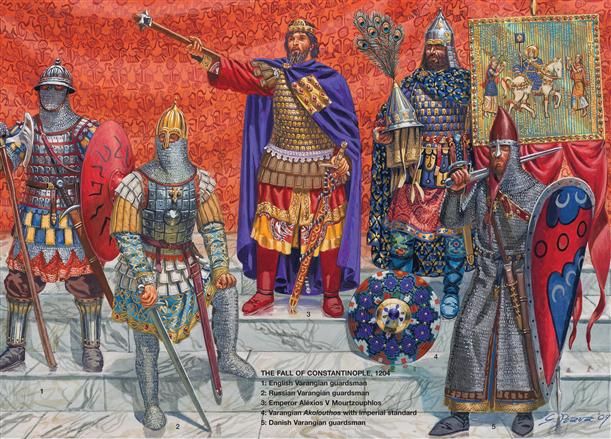The Varangian Guard
Posted: Mon Dec 18, 2017 1:01 pm
Realm of History have a good article on the famous Varangian Guard of the mediaeval Roman Emperor in Constantinople, in list format. British people take note of the epilogue to the Norman conquest of England being played out on the battlefield at Dyrrhachium in 1081 by Anglo-Saxon exiles in Varangian Guard service.

It should be remembered that despite the devastations and fragmentation from late antiquity onward, the Mediterranean remained as the dominant cultural and economical part of Europe through most of the Middle Ages.
Also, note that the Varangian Guard's dependability, in comparison to other Imperial Guard units, hinged both on excellent pay, being foreigners with no stake in internal issues of the empire and on their cultural honour code of a warrior's loyalty to a leader, adherence to oaths and virtual immunity to bribes (the latter described by Anna Komnena), aspects which likewise were crucial in ancient Roman use of Germanic bodyguard units (the original such corps was disbanded by Galba since the Germanic guard unit had remained loyal to Nero to the end, unlike the Praetorians). Writers in both the ancient and mediaeval Roman empire noted these barbaric northerner's fondness for getting drunk.
Of reference relevance to the High Elves of Ulthuan due to White Lions of Chrace.

It should be remembered that despite the devastations and fragmentation from late antiquity onward, the Mediterranean remained as the dominant cultural and economical part of Europe through most of the Middle Ages.
Also, note that the Varangian Guard's dependability, in comparison to other Imperial Guard units, hinged both on excellent pay, being foreigners with no stake in internal issues of the empire and on their cultural honour code of a warrior's loyalty to a leader, adherence to oaths and virtual immunity to bribes (the latter described by Anna Komnena), aspects which likewise were crucial in ancient Roman use of Germanic bodyguard units (the original such corps was disbanded by Galba since the Germanic guard unit had remained loyal to Nero to the end, unlike the Praetorians). Writers in both the ancient and mediaeval Roman empire noted these barbaric northerner's fondness for getting drunk.
Of reference relevance to the High Elves of Ulthuan due to White Lions of Chrace.
